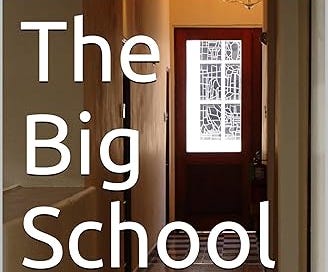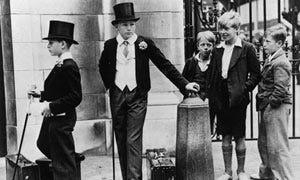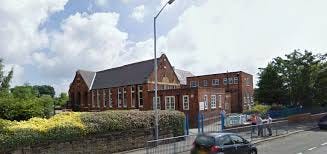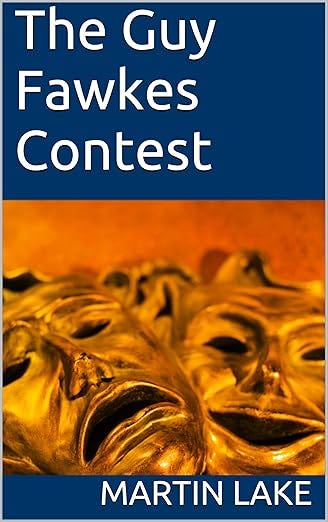SCHOOL CLASSES, SOCIAL CLASS AND ENDURING FRIENDSHIPS
I recently watched a video of Keith West’s 1967 song “Excerpt from a Teenage Opera” more popularly known as “Grocer Jack.” At first I was astounded at how poor and derelict the Britain of the 1960s looked. And then I realised that it was an accurate picture of the world I grew up in.
I lived in a street of 80 houses in Islington, North London, long before the area gentrified. At the back of my garden was an embankment where steam trains ran and drivers would lean out of their cab and wave to me. At the bottom of our street was the council dump and throughout the day, dustbin lorries would rumble up and down. We rarely saw any other vehicles.
When I was eight years old, the family moved 150 miles north to Chesterfield, Derbyshire. I loved our new council house - these was before such homes were rebranded with the mealy mouthed term social housing. It had gardens front and back, a bathroom and an indoor toilet which meant no more chilly excursions to the outside Privy. Best of all, my brother and I had separate bedrooms. Mine was tiny and inexplicably, the architects had seen fit to take up a large portion of the floor space with a bulkhead which would have been better suited to one of the other, larger bedrooms. Nevertheless, I adored my little bedroom and soon loaded the bulkhead down with clutter: toys, books, comics, interesting sticks and stones, Medieval and Roman coins found in a stream, hideous drawings and more promising short stories.
Yet though my house was a modern marvel, much of the rest of my life was not. My new street may not have been made of cobbles yet there was no London Underground and the nearest bus stop was a half a mile walk away. People spoke in a strange dialect, using words like “thee, thou and youth” which I thought had disappeared five centuries before. I had known the kids in my old street for ever and I was leader of my gang. Here, in Chesterfield, I realised that I lacked the skills to easily make new friends. Those I did befriend on sufferance were not really the sort I wanted to spend time with.
I had disliked the school I went to in London but I absolutely loathed the one in Chesterfield. It’s worth saying here that we had no knowledge of private schools other than the films of Saint Trinian’s and Billy Bunter, no knowledge that those who sent their children to such schools ruled the county.
For us, the whole focus was on the state system which played out a more shadowy version of the class system than the one where Eton, Harrow and others were at the top of the heap and where even prestigious Grammar Schools were considered second rate.
So it’s state schools which concerned us and Old Hall Primary School was the bottom of the barrel. A bleak, fortress like edifice it was like Dickens’ creation, Dotheboys Hall.
My class was presided over by a sadistic psychopath. He delighted in smacking children with a wooden ruler on their birthdays, made us write with ancient pens which we dipped in ink so that they would blot the page and thereby gave him the excuse for an explosion of wrath. He ordered those who came bottom of any test to report to his desk for ritual humiliation, hid our pens and then punished us for losing them and had a seemingly inexhaustible supply of wooden board rubbers which he flung about the classroom with venom. Eventually, he went too far, beat a boy with a cane because of the poor quality of his clothes and was sacked.
It was in my second year at school that my life changed. The teacher, Mr Alanson, had a fearsome reputation but his bark was worse than his bite and he had some enlightened practices like allowing us to choose books from his diverse bookcase for silent reading. I discovered Greek and Norse myths and legends and science fiction because of this. He also stocked the Children’s Newspaper and would encourage us to discuss current issues.
Yet the main purpose of the final year of Primary School was to battle-train us for the forthcoming 11-plus examination. State secondary schools in England and Wales were organised into the Tripartite system with three types of school. Grammar Schools were for the brightest twenty five percent, a few Technical Schools which focused on engineering and business skills and were supposedly meant for children of the same intelligence level but were often seen as Grammar school education on the cheap.
The remaining seventy five percent went to Secondary Modern Schools. The word Modern made them sound so up to date and cutting edge but they were rarely so. The system was meant to be equitable, with each type of school designed for the appropriate pupils and having parity of esteem. In actual fact, Secondary Moderns had less funding and less prestige. Children were said to either pass the 11- plus or fail it.
Those who had "failed" were sent there to learn rudimentary skills before advancing to factory or menial jobs. Many students left at 15 and so had no chance to take examinations and when they did they were usually CSE examinations, rather than the more prestigious O Level. Although teaching for the latter was available in some schools, fewer than one in ten students participated. Secondary moderns did not offer the Advanced Level, and in 1963, for instance, only 318 former secondary-modern pupils sat A levels. None went on to university.”
It’s also been suggested that 'baby boomer' generation was particularly affected during the period 1957 to 1970 because grammar-school places had not been increased to accommodate the large bulge in numbers during this period. As a result, the 11-plus standard for entry was inflated and many students who would have gained grammar schools places in earlier years were instead sent to secondary modern schools. It is also suggested that there were fewer Grammar school places for girls than boys.
This didn’t mean that every Secondary Modern School was bad. I had no intention of going to the local Grammar school with its aping of private schools, insistence on wearing short trousers and school caps and demanding academic standards. I would even have had to learn Latin. Not the sort of place for someone like me who hated school and was mildly school phobic.
I set my sights on going to a Secondary Modern, not the decaying old heaps which bore the names of local dignitaries such as Peter Webster and Harry Cropper. I wanted to go to Newbold Green Secondary Modern School with its bright, modern buildings (later found to be riddled with asbestos.) We had some excellent teachers and four of my class progressed to Higher Education – an equal number could have done but did not.
So, because of the race to get kids into Grammar School, the stakes were high in the last year of Primary School and despite his enlightened views, Mr Allenson recognised it. His desk was in the corner and five rows of desks were placed across the room. The two rows nearest him were occupied by the brightest of the class, including the superstar genius Stephen Holmes who was obviously nicknamed Sherlock and could name every country in the British Empire (or maybe he just studied the map on the wall) and could do mental arithmetic standing on his head. He sat at the very front of the row nearest Mr Allenson, the Siege Perilous which his nearest competitors lusted for. He was once demoted for a couple of weeks but when he proved that Einstein’s theory of relativity had a mistake and designed a space station he was reinstated to the top desk.
The rest of the class were allocated desks according to how Mr Allenson perceived they might do in the 11-plus. Inevitably, he paid most attention to those closest to him. Those who were settled into the gulag of the furthest desks slowly but surely began to adopt the role fitted for them. The most they could aspire to was to bring in the bottles of milk at playtime.
I was at the back of the third row, firmly in the camp intended for Secondary Modern land. And so was a boy who was destined to be my best friend. An added bonus was that Brian’s surname was Wyatt which gave him an air of the wild west and desperate gun fights. He was neither wild nor desperate but a staunch friend then and today. We even became blood brothers so maybe there was a touch of the wild west about him.
Friendship has been key to my life. And one day, as Brian and I walked home from school, we got a lesson in the value of friendship and, perhaps, the social class system.
We were almost knocked over by a large German Shepherd dog (or as we called them Alsatian) racing along the street. It careered into a garden and barked fiercely at the door. A woman opened it, glanced at the dog and then opened the door still wider. A Scotty dog stepped out and the two dogs raced around the garden, leaping and hiding, uttering cries of joy. True friendship, I thought.
And then, a totally innocent mongrel dog happened to be strolling nearby. The two friends glanced at each other, gave a yelp of excitement and then launched an attack upon the mongrel. It fled. Perhaps it deserved it but probably not.
Friendship can be good but in this case, it led to bullying.
If you’d like to read stories based on my childhood, check out The Big School and the Guy Fawkes Contest on Amazon.
https://viewauthor.at/MartinLake








